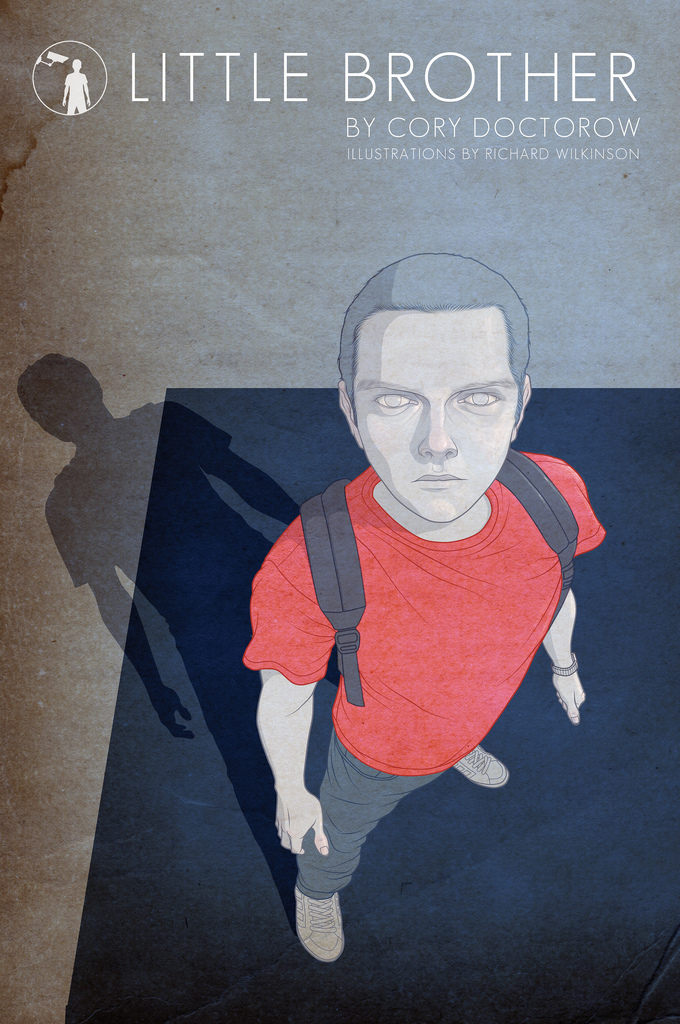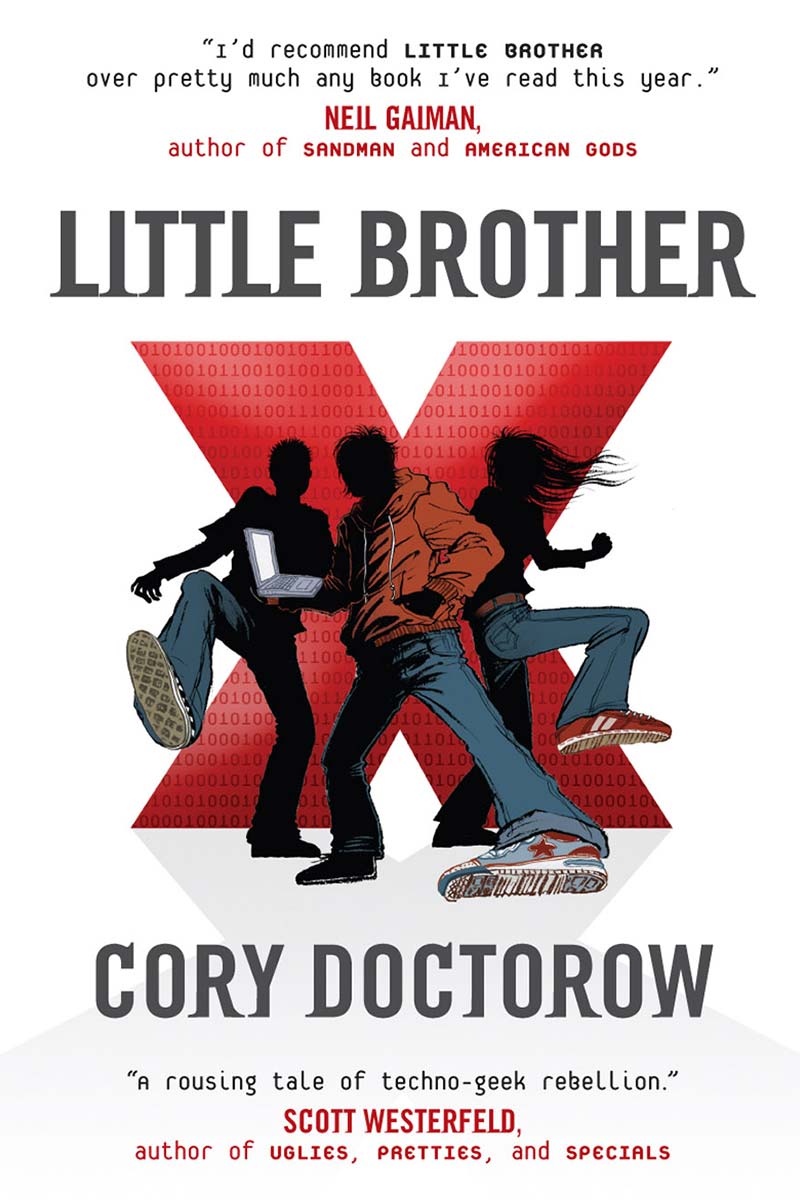
Figuring out how to tour a book in the lockdown age is hard. Many authors have opted to do a handful of essentially identical events with a couple of stores as a way of spreading out the times so that readers with different work-schedules, etc can make it.
But not me. My next novel, Attack Surface (the third Little Brother book) comes out in the US/Canada on Oct 13 and it touches on so many burning contemporary issues that I rounded up 16 guests for 8 different themed “Attack Surface Lectures.”
This has many advantages: it allows me to really explore a wide variety of subjects without trying to cram them all into a single event and it allows me to spread out the love to eight fantastic booksellers.
Half of those bookstores (the ones WITH asterices in the listing) have opted to have ME fulfil their orders, meaning that Tor is shipping me all their copies, and I’m going to sign, personalize and mail them from home the day after each event!
(The other half will be sending out books with adhesive-backed bookplates I’ve signed for them)
All of that is obviously really cool, but there is a huge fly in the ointment: given that all these events are different, what if you want to attend more than one?
This is where things get broken. Each of these booksellers is under severe strain from the pandemic (and the whole sector was under severe strain even before the pandemic), and they’re allocating resources – payrolled staff – to after-hours events that cost them real money.
So each of them has a “you have to buy a book to attend” policy. These were pretty common in pre-pandemic times, too, because so many attendees showed up at indie stores that were being destroyed by Amazon, having bought the books on Amazon.
What’s more, booksellers with in-person events at least got the possibility that attendees would buy another book while in the store, and/or that people would discover their store through the event and come back – stuff that’s not gonna happen with virtual events.
There is, frankly, no good answer to this: no one in the chain has the resources to create and deploy a season’s pass system (let alone agree on how the money from it should be divided among booksellers) – and no reader has any use for 8 (or even 2!) copies of the book.
It was my stupid mistake, as I explain here.
After I posted, several readers suggested one small way I could make this better: let readers who want to attend more than one event donate their extra copies to schools, libraries and other institutions.
Which I am now doing. If you WANT to attend more than one event and you are seeking to gift a copy to an institution, I have a list for you! It’s beneath this explanatory text.
And if you are affiliated with an institution and you want to put yourself on this list, please complete this form.
If you want to attend more than one event and you want to donate your copy of the book to one of these organizations, choose one from the list and fill its name in on the ticket-purchase page, then email me so I can cross it off the list: doctorow@craphound.com.
I know this isn’t great, and I apologize. We’re all figuring out this book-launch-in-a-pandemic business here, and it was really my mistake. I can’t promise I won’t make different mistakes if I have to do another virtual tour, but I can promise I won’t make this one again.
Covenant House – Oakland
200 Harrison St
Oakland
CA
94603
Madison Public Library Central Branch
201 W Mifflin St,
madison
wi
53703
Monona Public Library
1000 Nichols Rd
Madison
wi
53716
Madison Public Library Pinney Branch
516 Cottage Grove Rd
Madison
Wi
53716
La Cueva High School
Michael Sanchez
7801 Wilshire NE
Albuquerque
New Mexico
87122
YouthCare
800-495-7802
2500 NE 54th St
Seattle
WA
98105
Nuestro Mundo Community School
Hollis Rudiger
902 Nichols Rd, Monona
Monona
Wi
53716
New Horizons Young Adult Shelter
info@nhmin.org
2709 3rd Avenue
Seattle
WA
98121
Salem Community College Library
Jennifer L. Pierce
460 Hollywood Avenue
Carneys Point
NJ
8094
Sumas Branch of the Whatcom County Library System
Laurie Dawson – Youth Focus Librarian
461 2nd Street
Sumas
Washington
98295
Riverview Learning Center
Kris Rodger
32302 NE 50th Street
Carnation
WA
98014
Cranston Public Library
Ed Garcia
140 Sockanosset Cross Rd
Cranston
RI
2920
Paideia School Library
Anna Watkins
1509 Ponce de Leon Ave
Atlanta
GA
30307
Westfield Community School
Stephen Fodor
2100 sleepy hollow
algonquin
Illinois
60102
Worldbuilders Nonprofit
Gray Miller, Executive Director
1200 3rd St
Stevens Point
WI
54481
Northampton Community College
Marshal Miller
3835 Green Pond Road
Bethlehem
PA
18020
Metropolitan Business Academy Magnet High School
Steve Staysniak
115 Water Street
New Haven
CT
6511
New Haven Free Public Library
Meghan Currey
133 Elm Street
New Haven
CT
6510
New Haven Free Public Library – Mitchell Branch
Marian Huggins
37 Harrison Street
New Haven
CT
6515
New Haven Free Public Library – Wilson Branch
Luis Chavez-Brumell
303 Washington Ave.
New Haven
CT
6519
New Haven Free Public Library – Stetson Branch
Diane Brown
200 Dixwell Ave.
New Haven
CT
6511
New Haven Free Public Library – Fair Haven Branch
Kirk Morrison
182 Grand Ave.
New Haven
CT
6513
University of Chicago
Acquisitions Room 170
1100 E. 57th St
Chicago
IL
60637
Greenburgh Public Library
John Sexton, Director
300 Tarrytown Rd
Elmsford
NY
10523
Red Rocks Community College Library
Karen Neville
13300 W Sixth Avenue
Lakewood
CO
80228
Biola University Library
Chuck Koontz
13800 Biola Ave.
La Mirada
CA
90639
Otto Bruyns Public Library
Aubrey Hiers
241 W Mill Rd
Northfield
NJ
08225
California Rehabilitation Center Library
William Swafford
5th Street and Western Ave.
Norco
CA
92860
Hastings High School
Rachel Haider
200 General Sieben Drive
Hastings
MN
55033
Ballard High School Library
TuesD Chambers
1418 NW 65th St.
Seattle
WA
98117
Southwest Georgia Regional Library System
Catherine Vanstone
301 South Monroe Street
Bainbridge
GA
39819
Los Angeles Center For Enriched Studies (LACES) Library
Rustum Jacob
5931 W. 18th St
Los Angeles
CA
90018
SOUTH SIDE HACKERSPACE: CHICAGO
Dmitriy Vysotskiy or Shawn Coyle
1048 W. 37th St. Suite 105
Chicago
Illinois
60609
Rising Tide Charter Public School
Katie Klein
59 Armstrong
Plymouth
MA
02360
Doolen Middle School
Carmen Coulter
2400 N Country Club Rd
Tucson AZ
85716
Fruchthendler Elementary School
Jessica Carter
7470 E Cloud Rd
Tucson
AZ
85750
Brandon Branch Library
Mary Erickson
305 S. Splitrock Blvd.
Brandon South Dakota
57005
Alternative Family Education of the Santa Cruz City Schools
Dorothee Ledbetter
185 Benito Av
Santa Cruz
CA
95062
Helios School
Elizabeth Wallace
597 Central Ave.
Sunnyvale
CA
94086
Eden Prairie High School
Jenn Nelson
17185 Valley View Rd
Eden Prairie
MN
55346
44
Helios School
Elizabeth Wallace
597 Central Ave.
Sunnyvale
CA
94086
Flatbush Commons mutual aid library
Joshua Wilkerson
101 Kenilworth Pl
Brooklyn
NY
11210
46




































